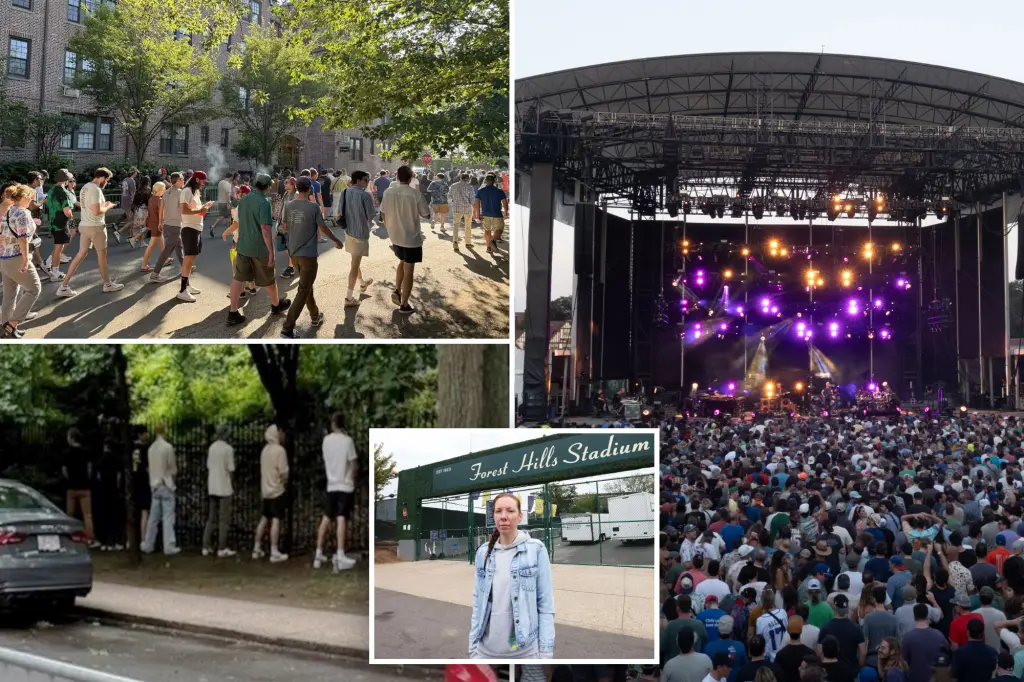Forest Hills Residents Take Legal Action Against NYPD Over Private Street Usage
In a significant escalation of an ongoing neighborhood dispute, the Forest Hills Garden Corporation (FHGC) has filed a federal lawsuit against the New York City Police Department, alleging unconstitutional seizure of private streets during concert events at Forest Hills Stadium. The lawsuit, representing nearly 4,000 homeowners in this historic Queens neighborhood, claims that police took control of private roads during more than 30 concert days this summer without proper compensation or authorization. “It’s about the city taking people’s property without paying for it,” explained Katherine Rosenfield, a partner at the law firm representing the FHGC. This legal action comes after the homeowner association explicitly revoked permission for the NYPD to manage their private streets during concert events, yet police continued to do so, facilitating crowd control for the stadium’s profitable concert series. The dispute highlights the complex intersection of private property rights, public safety, and commercial interests in one of New York’s most distinctive neighborhoods.
The conflict stems from a fundamental disagreement about property rights and fair compensation. According to city permitting policies, event organizers typically pay around $25,000 per day to shut down public streets on a scale similar to what was happening on FHGC property. Yet in this case, neither the city nor the concert promoters are compensating the homeowners’ association for the use of their private roads. The lawsuit contends that police barricades prevented even residents from accessing their own homes during concerts, with the complaint citing a particularly troubling incident involving an elderly woman who was injured after being forced to carry her luggage several blocks when police wouldn’t allow her taxi to reach her home. While the NYPD maintains they only operate on public streets, residents’ experiences paint a different picture. The FHGC is seeking financial compensation that could potentially reach into the millions, though the exact amount remains undetermined. Rosenfield emphasized this lawsuit was a last resort: “The neighborhood has been pretty much devastated by this… They don’t want to do this.”
The impact on daily life for Forest Hills Gardens residents has been substantial, with many feeling their community has been overtaken by commercial interests. Jenna Cavuto, a 33-year-old public school teacher who has lived in the Gardens since 2018, describes having to plan her life around concert schedules and navigate security checkpoints just to walk down her own sidewalk. “Sometimes I decide that I don’t have the strength to go through all of that,” she explained, noting that she and dozens of other residents often stay with family or book hotel rooms to avoid the concert-related disruptions altogether. Beyond the access issues, residents complain about concertgoers drinking, smoking, and urinating on private property, leaving trash that requires cleanup. The cumulative effect has left many feeling that “a private business is dictating our day-to-day lives,” as Cavuto puts it, particularly frustrating given that the stadium shares property with the tennis club from which it operates.
Not everyone in the community supports the lawsuit, however. Mitchell Cohen, former president of the FHGC, called the legal action “a shame” and suggested it was primarily driven by board members rather than reflecting the will of the entire community. “The vast majority of Forest Hills wants the Stadium to be successful,” Cohen stated, expressing frustration that “a few selfish members of the Community can waste so much time and money trying to kill something so many love.” This division within the neighborhood reflects the complex nature of the dispute, with some residents valuing the cultural and economic benefits the stadium brings to the area, while others prioritize their quality of life and property rights. Notably, local retailers have expressed support for the stadium, crediting concert events with generating significant revenue for area businesses.
This federal lawsuit marks the third legal action taken by Forest Hills residents in their ongoing conflict with Forest Hills Stadium and its operator, Tiebreaker Productions. Previous lawsuits directly targeted the stadium over noise concerns, with residents complaining about “house-rattling” sound levels during performances. The Department of Environmental Protection has issued multiple violations against the venue, with six citations from this past summer alone (down from eleven the previous year). For their part, Tiebreaker Productions and stadium management have consistently maintained that they follow all guidelines established by the FHGC, including adhering to a strict 10 pm curfew for concerts. The stadium has declined to comment on this latest legal development, as has the Mayor’s Office, while the dispute continues to unfold.
The Forest Hills Gardens situation raises important questions about the balance between public events and private property rights in dense urban settings. As cities increasingly embrace cultural events and entertainment venues as economic drivers, conflicts like this one may become more common. The lawsuit could potentially set precedent for how municipalities handle security and crowd control when private roads are involved, particularly when commercial interests benefit from public services. What began as a neighborhood disagreement has evolved into a constitutional question about property rights and fair compensation. For residents like Cavuto, the hope is that legal action will force the stadium to acknowledge and address the disruptions its operations cause to the surrounding community. As this case proceeds through the court system, both sides face the challenge of finding a sustainable compromise that respects private property rights while allowing cultural institutions to thrive in residential settings.


